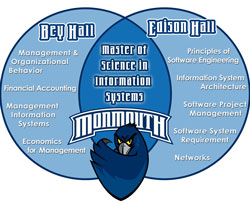A new graduate degree, Master of Science in Information Systems (MSIS), created to teach students how to process, manage and store data, was approved and will be offered to students in fall 2014. The program is the first cross-school program available to students in the School of Science and the Leon Hess Business School.
Dr. Michael Palladino, Dean of the School of Science, said 60 percent of courses for the program will be offered in computer science and software engineering and the remaining 40 percent will be offered in business courses.
According to Graduate Admissions, an information system is “a bridge between computing and business,” and the technology used in information systems gives businesses a competative edge in the marketplace. Information systems can benefits any business, ranging from healthcare to retail.
Information systems is a fast growing field that is essential for nearly every business, government agency, hospital, and nonprofit organization, according to Palladino. He said that the Bureau of Labor Statistics predicted that there will be 800,000 new information systems jobs with an average salary of $71,260 by 2016.
Graduate students in this program can choose to take a technology track or a management track, according to the Office of Graduate Admissions. Both options cover the software life cycle, information technology management and business strategic management with emphasis on a student’s selected track. This program requires 30-45 credits depending on prior academic work and students will also be required to produce a thesis before completing their degree.
The program was developed by faculty working with the Computer Science and Software Engineering Advisory Committee, a group of experts who make the University aware of key issues in their field, according to Palladino. He explained that the University also received input from companies such as CommVault and The U.S. Department of Veteran Affairs that have a high demand for people trained in information systems.
Dr. James McDonald, associate professor of software engineering, said that students studying business, computer science and software engineering would likely be interested in this program, but it would be beneficial to a variety of other students as well. Applicants must have a minimum 2.5 overall GPA and a minimum 3.0 GPA within their undergraduate major.
An MSIS can help students earn jobs such as business systems analyst, software project manager, software requirements developer, and information technology operations manager, according to Graduate Admissions.
“I am excited about the future career opportunities that will be available to our students who study for and earn a degree that blends science and business,” Palladino said. “These students will have developed a very marketable skill set and background.”
Kandria Ledesma, a senior biology major, said, “As a biology major and member of Enactus, the entrepreneurial organization of the business school, I believe this collaboration will benefit both schools by providing different resources which can enable and promote growth within the student body.”
Ledesma added, “Science students can benefit from business skills while business students can learn more about the sciences, which can help especially within systems in healthcare and administration.”
Though the University does not currently have an undergraduate information technology (IT) major, Palladino said that students who are pursuing an IT minor are well suited for this program. “Because of the two different tracks, students with either a business background or a technical background in computer science or software engineering can move seamlessly into the MSIS program,” said Palladino.
Palladino added, “Given that we live in a world that is increasingly depending on science and technology, greater collaboration between science faculty and faculty in other schools will help us create highly valuable and current curriculum options for students.”
Though McDonald said that there has not been much student response yet, Amanda Billotti, marine and environmental biology and policy major, said, “I support the creation of the information systems major. It seems like an up and coming field and will incorporate a large range of business and science related jobs. I would possibly consider getting a Master’s in this area in the future.”
In order to create a new Master’s program, the specific department puts together a proposal which goes through a chain of approvals, including the Enrollment Management Organization, the Faculty Council, the Board of Trustees, and the state of NJ, according to McDonald. The process of proposing the MSIS program began in June, 2013.
McDonald said that although the degree is new to the University, most of the courses in the curriculum already exist. Therefore, no new faculty will be hired to teach the classes required for the MSIS.
One new course has been added for this program, however. The Management Information System practicum is a two-semester course that students take at the end of their studies. “Basically what they do is get a series of lectures on business topics in the course and then they have to work on a project,” said McDonald. “They have to produce something that’s useful.”
McDonald said that the opportunity to offer these classes and work experience at the Master’s level is the most exciting aspect of this program. “I spent most of my career doing those sorts of things in industry,” said McDonald. “I worked in industry for 36 years and this is exactly what people need to do to work in industry.”
The Graduate Admissions Office will be holding a Dean’s reception and information session about the MSIS on Friday, March 7 from 3 pm to 4 pm in Wilson Hall for students interested in pursuing a MSIS.
For more information on the program, visit monmouth.edu/school-of-science/ms-information-systems.aspx.
IMAGE COMPILED by Christopher Netta


